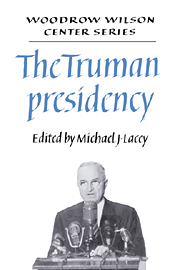Book contents
- Frontmatter
- Contents
- Acknowledgments
- Introduction and summary: The Truman era in retrospect
- 1 The mind and character of Harry S. Truman
- Part I Domestic politics and issues
- 2 Forging America's postwar order: domestic politics and political economy in the age of Truman
- 3 Attitudes toward industry in the Truman administration: the macroeconomic origins of microeconomic policy
- 4 Labor in the Truman era: origins of the “private welfare state”
- 5 Postwar American society: dissent and social reform
- 6 “Some sort of peace”: President Truman, the American people, and the atomic bomb
- Part II Foreign policy and national defense
- About the authors
- Index
3 - Attitudes toward industry in the Truman administration: the macroeconomic origins of microeconomic policy
Published online by Cambridge University Press: 06 October 2009
- Frontmatter
- Contents
- Acknowledgments
- Introduction and summary: The Truman era in retrospect
- 1 The mind and character of Harry S. Truman
- Part I Domestic politics and issues
- 2 Forging America's postwar order: domestic politics and political economy in the age of Truman
- 3 Attitudes toward industry in the Truman administration: the macroeconomic origins of microeconomic policy
- 4 Labor in the Truman era: origins of the “private welfare state”
- 5 Postwar American society: dissent and social reform
- 6 “Some sort of peace”: President Truman, the American people, and the atomic bomb
- Part II Foreign policy and national defense
- About the authors
- Index
Summary
During the 1980s a seemingly endless series of troubles plagued the economy of the United States, some new in Americans' experience and others supposedly banished long ago. The problems, often interrelated, included intractable unemployment combined with inflation, slow growth in national output and in output per worker-hour, loss of international competitiveness in major industrial sectors, and uncontrollable increases in the cost of social services such as medical care. During the same decade the United States saw other countries, notably Japan but also West Germany, South Korea, and a few others, deal successfully with some or all of these problems. And Americans have wondered why. Various hypotheses have been put forth, including suggestions that the size of the U.S. defense effort reduced the nation's capacity to cope with other difficulties, that victory in war paradoxically led to sclerosis of the economic system, that the distinctive “spirit” of American society constrains it from dealing effectively with late twentieth-century challenges, and finally that somewhere along the way the American people consciously chose to accept a relationship between the private and public sectors that damaged the two and made them unable to formulate effective, cooperative responses to new challenges. This American social dilemma is contrasted with “Japan Inc.” and West Germany and the close relationships there among government, business, and labor.
In this essay the choice of a public-private relationship during the administration of President Truman is explored, for those eight turbulent years following World War II.
- Type
- Chapter
- Information
- The Truman Presidency , pp. 89 - 127Publisher: Cambridge University PressPrint publication year: 1989
- 4
- Cited by



